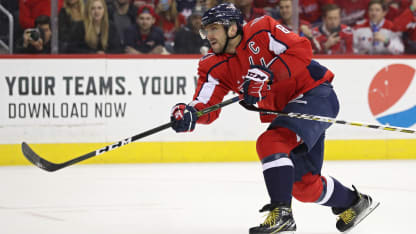Established by the U.S. Hockey Hall of Fame in 1999, the Gretzky award honors international individuals who have made major contributions to the growth and advancement of hockey in the United States.
Ovechkin, a Moscow native selected by the Washington Capitals with the No. 1 pick of the 2004 NHL Draft, has generated interest and participation in hockey in Washington, Maryland and Virginia throughout his 14 seasons in the League.
"It's a great award," Ovechkin said. "It's not about me. It's how all of us are kind of ambassadors. It doesn't matter what country are from. You try to grow hockey whether it's in the United States or China or wherever. So, I think it's pretty cool."
According to USA Hockey's annual report, there were 8,975 registered players ages 18 and under in Washington (223), Maryland (4,767) and Virginia (3,985) in Ovechkin's rookie season of 2005-06. That number rose to 13,435 for 2018-19, including 801 in Washington (an increase of 259 percent), 6,460 in Maryland (36 percent increase) and 6,174 in Virginia (55 percent increase).
"It's been growing fast," Ovechkin said. "This is my 15th year [in the NHL] and every time you go somewhere, people recognize you, kids recognize you. It's a fun thing."
Ovechkin, who celebrated his 34th birthday Tuesday, has always been committed to helping grow the sport in the area, particularly among children.
"If not the kids, who else is going to play?" Ovechkin said.
Ovechkin launched Ovi's Crazy 8's in 2006 to provide underserved children with tickets to Capitals games, allowing more than 5,000 individuals the chance to see a game free of charge. The Capitals captain will host players from the American Special Hockey Association, an organization that provides people with developmental disabilities a chance to learn and play hockey, for an event for the sixth straight season.
He also supports organizations that facilitate wishes of sick children, having granted several wishes during his time with the Capitals.
"Alex Ovechkin has inspired the next generation of players in the greater Washington, D.C. area and well beyond," USA Hockey president Jim Smith said. "Apart from his talent on the ice, he's made an enormous contribution to the hockey community off the ice as well."
Ovechkin ranks 13th in NHL history with 658 goals and 45th with 1,211 points in 1,084 games. With 42 goals this season, he'd become the eighth player to score 700.
The left wing has led the NHL in goals a League-record eight times, including last season when he scored 51. That was his eighth 50-goal season, one short of the League record shared by Gretzky and Mike Bossy.
In addition to winning the Maurice Richard Trophy for leading the NHL in goals eight times, Ovechkin won the Art Ross Trophy for leading the League with 112 points (65 goals, 47 assists) in 2007-08. He won Calder Trophy as the NHL's top rookie in 2005-06, the Hart Trophy as the League's most valuable player three times (2007-08, 2008-09, 2012-13) and the Ted Lindsay Award (formerly the Lester B. Pearson Award) as the League's most outstanding player as voted by members of the NHL Players' Association three times (2007-08, 2008-09, 2009-10).
Ovechkin also won the Conn Smythe Trophy as most valuable player of the Stanley Cup Playoffs in 2018 when he scored a League-high 15 postseason goals and helped Washington win its first championship.
"His performance on the ice and efforts off the ice have certainly translated into more kids and families wanting to be involved in our sport," USA Hockey executive director Pat Kelleher said. "He's been a great ambassador for hockey and embodies what the Gretzky award represents."
Ovechkin will be the second Russia-born individual to receive the award, following Anatoli Tarasov, the 2008 recipient known as "the father of Russian ice hockey" who coached the Soviet Union's national team to prominence from 1946 to 1975. Other recipients have included Emile Francis (2015), Murray Costello (2012), Herb Brooks (2004), Bobby Hull (2003), Scotty Bowman (2002), Scotty Morrison (2001), the Howe family (2000) and Gretzky (1999).

